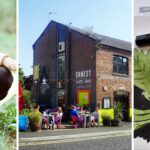- Work Hard
- 9th Feb 2021
- 886 Views
- 0
- 1 minutes
Meet the North East scientist leading the clean meat revolution

HLN caught up with Dr Martina Miotto, former Newcastle University PhD student and local entrepreneur, who has developed a trailblazing new solution that promises to revolutionise the ethical food debate – and save the lives of countless animals










Comments